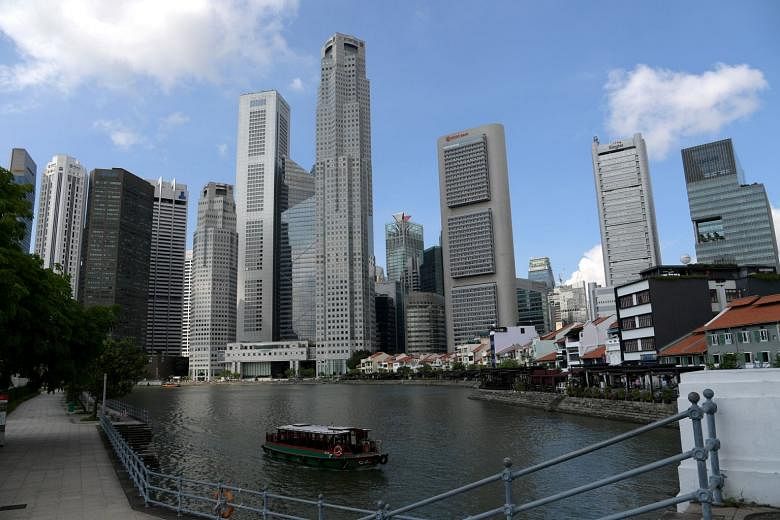Singapore has so far escaped relatively unscathed from the United States-China trade conflict, but this is set to change.
"The negative spillovers of the trade war are likely to impact the Singapore economy in the latter part of this year and beyond," the Monetary Authority of Singapore (MAS) said in its half-yearly macroeconomic review yesterday.
As a result, Singapore's economy is likely to expand at a slower pace for the rest of the year. While MAS expects full-year growth this year to fall in the upper half of its official forecast of 2.5 per cent to 3.5 per cent, it will moderate slightly next year, said the central bank.
"Although there has been some detente between the US and several of its trade partners, trade tensions remain at the forefront of consideration for global growth prospects," it said.
This makes next year a more uncertain year for Singapore's economy, analysts said, echoing the MAS view that uncertainties have increased since April.
The central bank pointed out that the trade war could also open up some opportunities for Singapore. But this had to be balanced against the negative fallout.
Singapore's electronics segment could be hit by the trade conflict as both Singapore and China are key nodes in the global supply chain - and about half of China's electronics exports to the US now face higher tariffs.
-
SINGAPORE'S ECONOMY IN NUMBERS
-
GROSS DOMESTIC PRODUCT (GDP)
3.4%
Average GDP growth for the second and third quarters of 2018, down from 4.1 per cent in the previous two quarters.
2.5% to 3.5%
Growth forecast for this year.
CORE INFLATION
1.9%
Core inflation for the third quarter, up from 1.5% in the first half of the year.
1.5% to 2%
Inflation forecast for this year.
LABOUR MARKET
2.1%
Unemployment rate for third quarter of 2018, up slightly from 2 per cent in the second quarter.
3.8%
Wage growth in first half of 2018, up from 3.1 per cent last year.
However, Singapore stands to gain from some positive spillovers as international firms reconfigure their supply chains in response to tariffs on their businesses, said MAS.
It cited a recent survey by AmCham China and AmCham Shanghai which showed that of the 430 American firms polled, around one-third have either moved or are considering moving their production out of China. South-east Asia was the top destination they wanted to relocate to.
MAS said Singapore's hub status means the country can gain some of the positive spillovers at the margin, especially in services such as wholesale trade, transportation and storage.
Even if companies choose to relocate factories to nearby countries, Singapore benefits indirectly if their head offices are set up here too, said Fitch Solutions head of Asia country risk Chua Han Teng.
But this is a longer-term effect and is not likely to offset the downsides of the trade conflict right away, said UOB senior economist Alvin Liew.
"A factory cannot turn up overnight in Vietnam or Singapore, so there is a significant lag time involved," said Mr Liew.
The trade war could impact different elements of the economy - as seen in other numbers released yesterday.
Manufacturing output fell 0.2 per cent last month, its first negative reading since December last year, with the electronics cluster falling 5.5 per cent.
Meanwhile, the labour market is still expected to improve further, with wages rising by 3.8 per cent year on year in the first half of this year and total employment continuing to expand by 10,100 jobs in the same period.
And while the Ministry of Manpower confirmed that retrenchments fell in the third quarter and total employment grew, economists such as OCBC Bank's head of treasury research and strategy Selena Ling said that a prolonged trade war could prompt businesses to delay or cancel their hiring plans here, while consumers may tighten spending.
This, in turn, could have an impact on prices. Core inflation rose 1.9 per cent year on year in the third quarter, up from an average of 1.5 per cent for the first half of the year. Headline inflation for all items is tipped to rise above 1 per cent next year from the projected 0.5 per cent this year. The trade war may change these projections.


